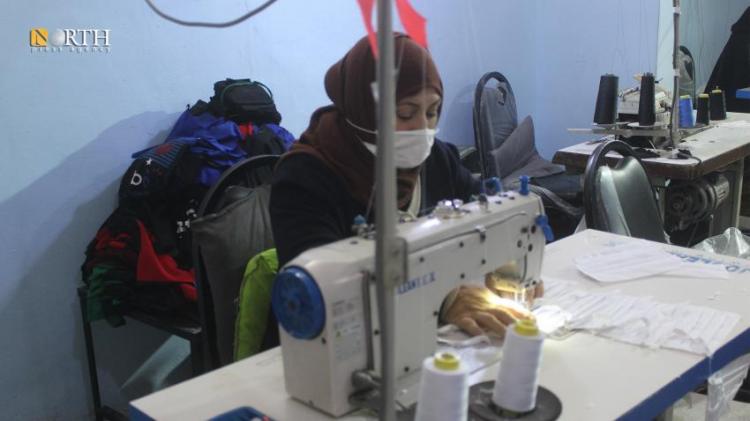Manbij – North-Press Agency
Saddam al-Hassan
Sakinah Asaliya, a sewing workshop in al-Hazawneh neighborhood in the southern side of Manbij city, northern Syria, has turned from sewing clothes to producing masks, in order to secure the needs of the people after a lack of availability in pharmacies and warehouses, and after the great demand to buy masks, gloves and sterilizers due to the outbreak of the novel coronavirus in the world.
Doaa Aqili, the administrator in charge of the sewing workshop, told North-Press that the idea of manufacturing masks came after coordination with the Health Board in the city of Manbij, and in order to meet the needs of the residents of Manbij for the preventative supplies against coronavirus, so the sewing workshop started sewing the masks. This led to the continuation of the work by the workers of the workshop, while most other people stopped working during the lockdown period.
The number of workers in the workshop before the ban on movement was 30 tailors, while only ten tailors (five women and five men) work now, in order to avoid crowding and as a measure to prevent the spread of the coronavirus.
According to the sewing workshop's management, the work hours go from 7:00 a.m. to 4:00 p.m., with a production capacity of 1,500 masks per day, after which they are transferred to the warehouses of the Health Board in the city then distributed to pharmacies later.
Pharmacist Mohamed al-Omar told North-Press that the problem of lack of masks in the market is due to the closure of crossings and the monopoly of merchants.
He added that the price of a box of 50 masks previously cost 500 Syrian pounds, but now the price has exceeded 18,500 Syrian pounds, while the price of a liter of alcohol used for sterilization has increased from 1,500 to 4,000 Syrian pounds with a lack of availability in pharmacies and drug stores.
In turn, Hanan al-Ahmad, from the Health Board in the city of Manbij, explained that the coordination of the Health Board with the sewing workshop to manufacture masks came according to the required health conditions.
She added that the Health Board is securing fabrics for the manufacture of masks for the sewing workshop, and after the completion of sewing and delivery, the Health Board sterilizes them with chlorine and transports them to its own warehouses, to be distributed later to the civil and military administration institutions and to the city's pharmacies.
With the implementation of the lockdown decision issued by the Autonomous Administration of North and East Syria on March 23rd, the Civil Administration in Manbij halted civil traffic for all three crossings surrounding Manbij (Oun al-Dadat, Um Jaloud, and al-Tayha), but it allowed the entry of all food and vegetables to Manbij after their examination by specialized committees of the Health Board.

